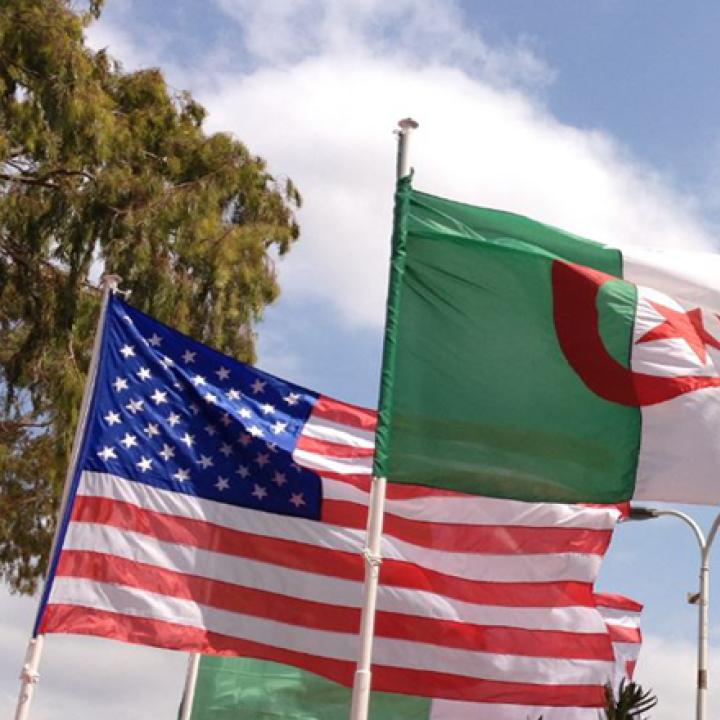
- Policy Analysis
- Policy Alert
What Would Another Tebboune Victory Mean for U.S.-Algeria Relations?

The incumbent president is set to win another term, but shifting opposition politics at home and geostrategic realities abroad could raise bilateral bumps down the road.
When Algerians head to the polls on September 7 for the first round of their presidential election, incumbent Abdelmadjid Tebboune will face two opponents: Youcef Aouchiche of the left-leaning Socialist Forces Front (FFS) and Abdelaali Hassani Cherif of the Movement of Society for Peace (MSP), an Islamist party. Given Tebboune’s position of strength as the establishment candidate, there is little doubt he will win.
Yet the president faces a very different context compared to the 2019 election, when the country was shaken by a mass protest movement known as the Hirak. At the time, Tebboune was a minor politician whose main claim to fame was holding the shortest prime ministerial tenure in Algeria’s history (May-August 2017). Five years on, his supporters argue that he has enabled a return to normalcy and the functioning of institutions without the violence experienced in Libya or the political turmoil seen in Tunisia, despite the country’s ongoing domestic and foreign challenges.
Opposition Shifts and Turnout Concerns
In 2019, five candidates competed, all more or less representative of the nationalist current that has ruled Algeria since independence. Yet this year’s candidates have very different profiles, revealing two key lessons about the country’s current political context.
The first is that the Islamist factions that have chosen to participate in recent elections are not perceived as a threat. Just before the 2021 parliamentary vote, when the MSP was poised to increase its number of seats, Tebboune told the press, “This political Islam does not bother me because it is not above the laws of the Republic, which will be applied to the letter.”
Clearly, the MSP’s strategy after 2019—presenting itself as a credible alternative on the Algerian political landscape—did not pan out. Although it is the only major opposition party to take part in every organized election, the majority of voters have not embraced its policy positions. For instance, the MSP campaigned against a 2020 constitutional revision that wound up receiving 66.8 percent approval in a public referendum. Hassani’s more discreet personality as party leader compared to his outspoken predecessor, Abderrazak Makri, has only made the MSP even more innocuous.
The second lesson is that Algerian authorities are focused on mobilizing voters in Kabylia, the home region of Kabyle Berbers. In the 2019 election, turnout in that region was close to zero. It is no coincidence that Tebboune chose Tizi Ouzou, the capital of Kabylia, for a visit in July just before the campaign period kicked off. At the same time, authorities continue to emphasize their action against the Movement for the Self-Determination of Kabylia (MAK), which they accuse of terrorism. The presence of the young FFS candidate, Aouchiche, will tighten the link between this northern region and the national election. The large opposition party is mainly Berber and continues to enjoy significant popularity (as attendance at its recent meetings has confirmed), albeit not as much as in the past.
Ultimately, national turnout will be the true indicator of a successful reelection for Tebboune, whose 2019 victory saw only 40 percent voter participation overall. In that sense, the surprise decision to hold the election this month rather than December points to a paradox of sorts for the government. On one hand, the earlier date gave opposition candidates less time to prepare; on the other hand, September is a popular vacation period in Algeria, so most of the population will not be focused on the vote.
Key Issues in a Second Tebboune Term
Tebboune has largely campaigned on the economic successes achieved during his first term. For example, oil revenues rose by 70 percent in 2022 thanks to increased exports, as European markets sought to replace Russian natural gas amid the Ukraine war. He has also promised to expand housing, extend social benefits (e.g., increased pensions), create new jobs, and continue growing the economy. Each of these initiatives will depend on how well he tackles challenges such as rising inflation.
In addition, Algeria has been steadily reasserting itself on the international stage under Tebboune. To be sure, the country’s external position does not appear particularly strong at the moment, with unrest on the border with Mali, instability in Libya, and tensions with European countries over their positions on the disputed Western Sahara region. Yet such conditions could wind up bolstering Tebboune’s campaign and guaranteeing that he will keep pushing the narrative of Algeria’s influence abroad.
Implications for U.S. Policy
Under a second Tebboune presidency, Algeria will likely be keen to continue deepening its engagement with the United States and positioning itself as Europe’s main energy supplier. In the short term, this will be a win-win for Washington and Algiers, particularly in areas such as counterterrorism cooperation. In the long term, however, the same issues that have challenged the partnership for decades will persist—not just Algeria’s lack of political and economic openness, but also its unwillingness to admit that Russia’s destabilizing actions in North Africa and the Sahel have a negative impact at home and on the region as a whole.
Sabina Henneberg is a Soref Fellow at The Washington Institute. Souhire Medini is a visiting fellow at the Institute, in residence from the French Ministry for Europe and Foreign Affairs.




